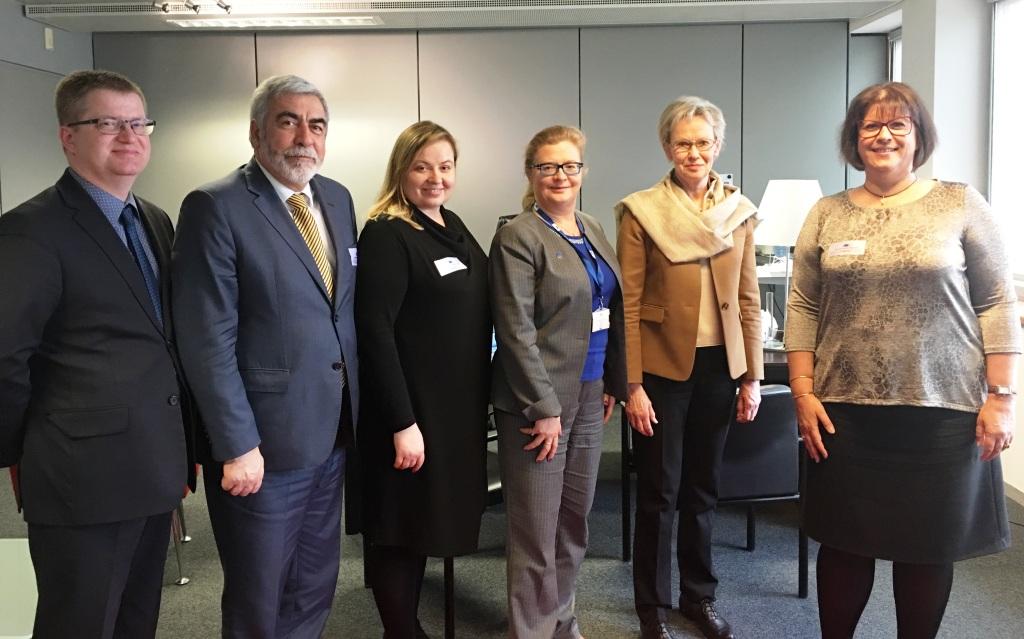
On 14 March 2017, a delegation of the UEHJ composed of Françoise Andrieux, President, Jose-Carlos Resende, Vice-President, Janek Pool, Member of the Executive Committee and Dovile Satkauskiene, Secretary-General, was received at the European Commission in Brussels by Tiina Astola, Director General of the Directorate-General for Justice and Consumers, Salla Saastamoinen, Director of the Directorate for Civil and Commercial Justice, and Regina Hernandez Escriva, Policy Officer.
It should be reminded that the European Union of Judicial Officers (UEHJ) represents 23 member countries of the European Union (Belgium, Bulgaria, Cyprus, Czech Republic, Denmark, England and Wales, Estonia, Finland, Germany, Greece, Hungary, Italy, Latvia, Lithuania, Luxembourg, the Netherlands, Poland, Portugal, Scotland, Slovakia, Romania, Spain, Sweden) and two countries in the process of accession to the European Union (Montenegro, Serbia). Today, the composition of the UEHJ makes this organisation the only interlocutor capable of providing significant information and statistics to the European Commission concerning the profession of judicial officer and its activities.
During the meeting the President of the UEHJ emphasised that communication between the 25 UEHJ country members and being linked to EU strategy ensures common proposals from the states even if they have different enforcement systems. The UEHJ focuses on efficiency of enforcement and highlights in every country all the elements of good governance.
Janek Pool presented the UEHJ from the decision of its creation in 2011 until its completion. It was mentioned that UEHJ organisation has a strong scientific background. During the meeting the STOBRA projects were presented. The great importance to cooperate with the European Commission was discussed. The UEHJ experts are gathering answers from all country-members to prepare useful recommendations. The European Commission representatives were invited actively to participate in the future UEHJ Stobra conference in Brussels and provide insights and advices.
President Andrieux expressed that e-Justice is a leading theme in EU prospective strategy, as the current 42 projects in this field show. This is why responsible institutions should look on the overall e-Justice picture and strategic priorities. The UEHJ periodically prepares studies that may match the European Commission’s main goals and perspective. For example Estonia and Portugal are closely involved in e-Service of documents development projects. José-Carlos Resende presented the e-Auction system in Portugal. The UEHJ is intending to ask the ministries of Justice of country-members about the current situation in countries regarding e-Justice and e-Service of documents. This information will then be shared with the European Commission.
The European Commission representatives were interested in how the European Account Preservation Order is used in different countries. It is clear that more time is needed before the application of this instrument can constitute the basis for case law of doctrine from different countries.
Dovile Satkauskiene shared best practice from Lithuania regarding e-Auctions and service of foreign documents in civil cases according to Regulation No.1393/2007 as from 1st of January 2016 Lithuanian judicial officers took this activity from the national courts competence.
The European Commission representatives showed interest in judicial officers’ training. Françoise Andrieux presented the European Training Day, which started in 2008, and emphasised that the UEHJ has new ideas regarding training. The UEHJ is creating training modules which will be presented to the other UEHJ member-countries. E-Learning is very important and is an integral part of developments in training.
EU digitalisation is a part of a better public administration. Likewise, data is very important for the development of e-Justice. In that respect, the European Commission expressed its need for data: seizures of immovable, length of the enforcement, etc. The UEHJ will ensure to play a leading role in all these fundamental matters.